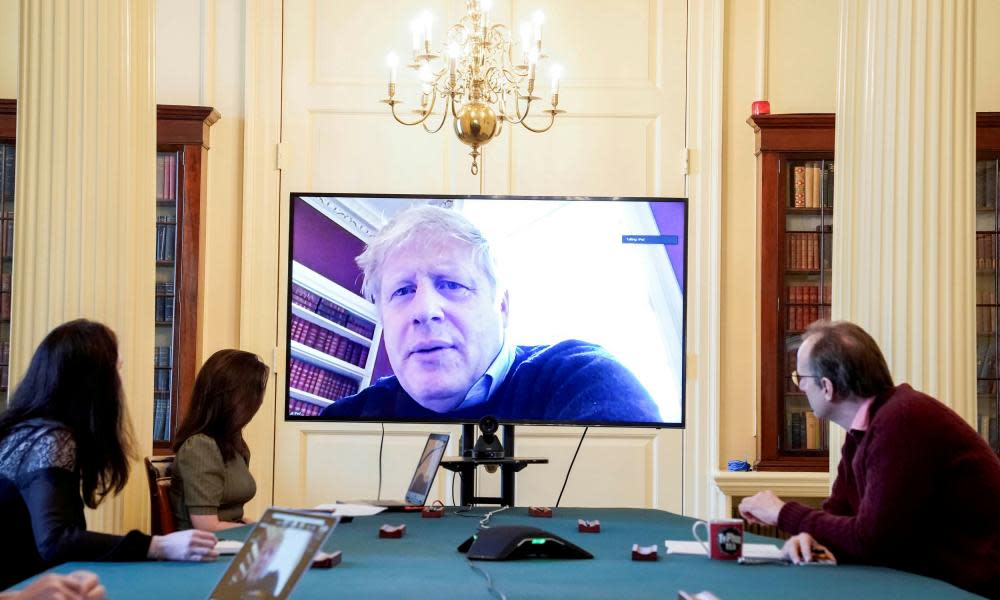The Guardian view on Boris Johnson in hospital: a crisis of authority

The particular cruelty of coronavirus lies in the terrible solitude it inflicts on human beings at the very time they crave warmth and love. Boris Johnson’s partner, Carrie Symonds, who has been self-isolating after showing symptoms of the virus, will not have been able to hug him as he was taken to St Thomas’ hospital on Sunday; nor can she visit the prime minister as he occupies an intensive care bed. That Ms Symonds is heavily pregnant with the couple’s child adds another dimension of anxiety and fear to a nightmarish turn of events.
The alarming deterioration in Mr Johnson’s condition, a week and a half after he tested positive for Covid-19, will have vividly brought home to families across the country how the virus, once it takes a grip, can drag relatively fit people into unknown, dangerous territory. The entire nation should hope for his swift recovery. But because the prime minister is who he is, thoughts must inevitably turn to the public consequences of his personal misfortune. They are serious and worrying. The government now finds itself in uncharted waters, as the epidemic in Britain moves towards an anticipated peak roughly a week from now. Unfortunately, the arrangement the prime minister leaves behind is murky and potentially unstable.
The foreign secretary, Dominic Raab, has been asked by the prime minister to deputise for him “where necessary”. By making Mr Raab first secretary of state in the government, Mr Johnson effectively conferred deputising powers on him. But Britain’s unwritten constitution offers no guidance on the scope of those powers, or on how the cabinet should proceed if the prime minister is absent for a lengthy period. At today’s press conference, Mr Raab expressed the conviction that Mr Johnson would be back at the helm “in short order”, but refused to answer questions over the extent to which he was empowered to change strategy or overrule cabinet colleagues.
This lack of clarity over leadership matters. The mandate Mr Johnson convincingly won in last December’s election was a peculiarly personal one. It derived from his pledge to succeed where Theresa May had failed, and deliver Brexit. Victory gave his decision-making in the current crisis – flawed though it has been – a legitimacy and authority that Mr Raab, or any other member of the cabinet, will struggle to replicate. That is all the more true after the extraordinary events of Monday’s press conference, at which the foreign secretary offered only the information that the prime minister was in good spirits. Barely an hour later, Mr Johnson was taken into intensive care. The government and its advisers appeared to believe that the seriousness of his illness could be kept private, as his duties were stripped back behind the scenes. An ill-judged reassurance strategy may have squandered reserves of public trust at a vital moment.
The weeks to come will require some of the most fraught political calls any peacetime government has had to make. Given accumulating evidence that social distancing measures are slowing the spread of coronavirus, Britain’s lockdown will surely be extended into May. Public acquiescence for this will need to be won and maintained. That will become harder as countries where the epidemic has already peaked begin to ease lockdown measures. As some analysts forecast the severest economic downturn in Britain for a century, there have been reports of tensions between the Treasury and the Department of Health and Social Care over the fallout from a prolonged shutdown. Judgments on matters such as this will be made immensely more difficult in the absence of clear leadership and lines of accountability.
Michael Gove, the chancellor of the Duchy of Lancaster, today rejected the notion of a national unity government to steer the country through the next phase of an unprecedented crisis. But if a leadership vacuum does begin to emerge, some form of cross-party arrangement may need to be considered to ensure continuing public consent for tough decisions. In New Zealand, a cross-party coronavirus committee, chaired by the opposition leader, is tasked with scrutinising and informing government actions. It is a model that is worth keeping in mind, as the country wishes Mr Johnson well.

 Yahoo News
Yahoo News 
